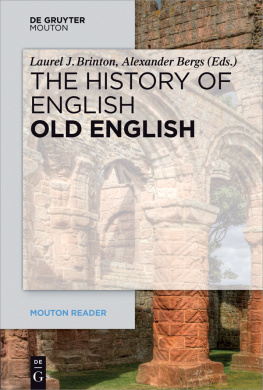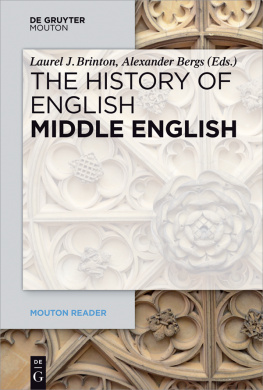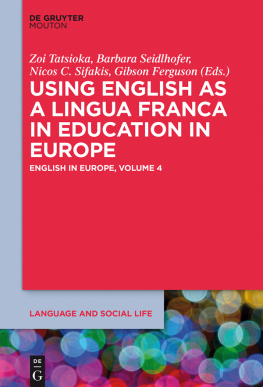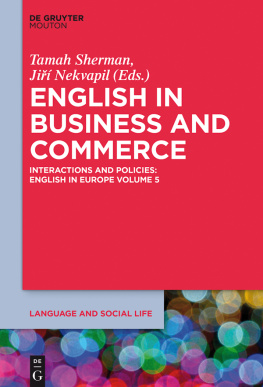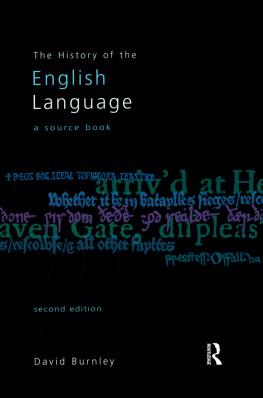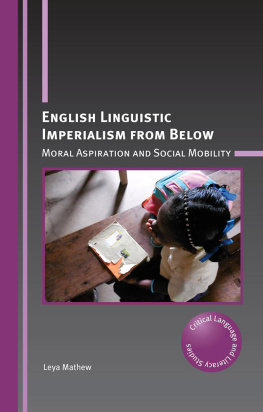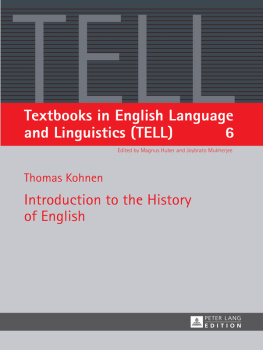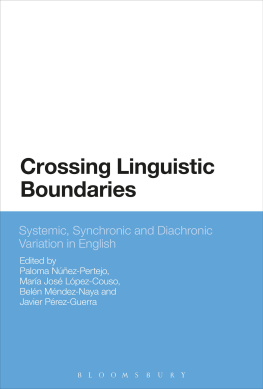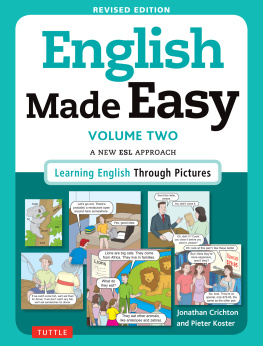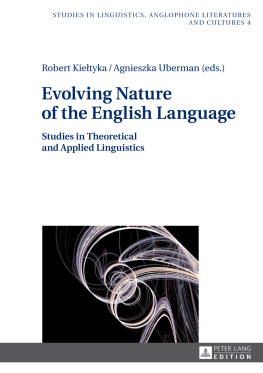Table of Contents
Guide

Laurel J. Brinton and Alexander Bergs (Eds.)
The History of English
Volume 2
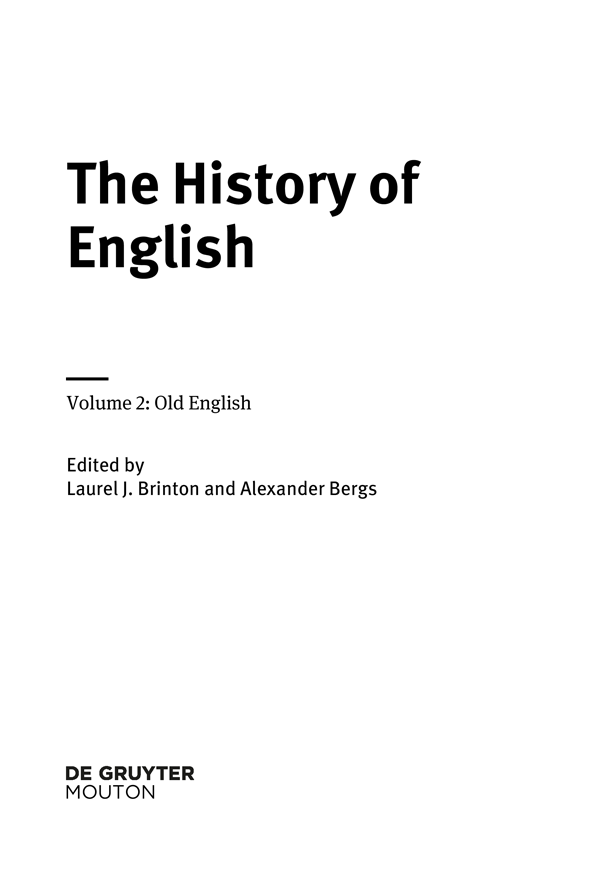
ISBN 978-3-11-052273-0
e-ISBN (PDF) 978-3-11-052530-4
e-ISBN (EPUB) 978-3-11-052305-8
Library of Congress Cataloging-in-Publication Data
A CIP catalog record for this book has been applied for at the Library of Congress.
Bibliographic information published by the Deutsche Nationalbibliothek
The Deutsche Nationalbibliothek lists this publication in the Deutsche Nationalbibliografie; detailed bibliographic data are available on the Internet at: http://dnb.dnb.de.
2017 Walter de Gruyter GmbH, Berlin/Boston
Cover image: russwitherington1/iStock/Thinkstock
www.degruyter.com
Abbreviations
| ACC | accusative case |
| ACT | active |
| ADJ | adjective |
| ADV | adverb |
| AN | Anglo-Norman |
| Angl. | Anglian |
| AUX | auxiliary |
| C | consonant |
| COMPR | comparative |
| DAT | dative case |
| DEM | demonstrative |
| DU | dual |
| EModE | Early Modern English |
| EWSax. | Early West Saxon |
| FEM | feminine |
| Fr. | French |
| GEN | genitive case |
| Ger. | German |
| Gk. | Greek |
| Go. | Gothic |
| Grmc. | Germanic |
| IE | Indo-European |
| IMP | imperative |
| IND | indicative |
| INF | infinitive |
| INFL | inflected |
| INSTR | instrumental case |
| Kent. | Kentish |
| LAEME | A Linguistic Atlas of Early Middle English |
| LALME | A Linguistic Atlas of Late Mediaeval English |
| Lt. | Latin |
| LModE | Late Modern English |
| LWSax. | Late West Saxon |
| MASC | masculine |
| ME | Middle English |
| MED | Middle English Dictionary |
| ModE | Modern English |
| NEG | negative |
| NEUT | neuter |
| N | noun |
| NOM | nominative case |
| NP | noun phrase |
| O | object |
| OBJ | objective case |
| OE | Old English |
| OED | Oxford English Dictionary |
| OFr. | Old French |
| OHG | Old High German |
| ON | Old Norse |
| P | person |
| PASS | passive |
| PAST | past tense |
| PDE | Present-day English |
| PGrmc. | Proto-Germanic |
| PIE | Proto-Indo-European |
| PL | plural |
| PREP | preposition |
| PRON | pronoun |
| PRTC | participle |
| PRES | present tense |
| PRET | preterit |
| S | subject |
| SG | singular |
| SUBJ | subjunctive mood |
| SUP | superlative |
| SOV | subject-object-verb word order |
| SVO | subject-verb-object word order |
| T | tense |
| V | verb |
| V 2 | verb second |
| V | vowel |
| VO | verb-object word order |
| VP | verb phrase |
| WGrmc. | West Germanic |
| WSax. | West Saxon |
| > | changes to, becomes |
| < | derives from |
| no ending |
| * | reconstructed form, ungrammatical form |
| < > | spelling |
Laurel J. Brinton and Alexander Bergs
Chapter 1: Introduction
Laurel J. Brinton: Vancouver (Canada)
Alexander Bergs: Osnabrck (Germany)
1English Language Studies
The study of the English language has a lengthy history. The second half of the 18th century saw a phenomenal increase in the number of published grammars of the vernacular language, while the field of comparative linguistics arising in the 19th century was concerned in large part with the Germanic languages, including English. Moreover, in the field of theoretical linguistics that English has played a truly central role. While there are no reliable statistics, it seems safe to say that the majority of studies in contemporary linguistics deal at least in part with English, and are also written in English.
During the 20th century, monumental works concerned with the English language, both synchronic and diachronic, were produced, following historical/comparative and more contemporary linguistic approaches. In keeping with developments on the field of general linguistics, today it is possible to find descriptions and analyses of the history and development of English from virtually any linguistic perspective: external, internal, generative, functional, sociolinguistic, pragmatic, comparative, phonological, morphological, syntactic, lexical, semantic. There are numerous Histories of English to cater to just about every (theoretical) taste, as well as detailed descriptions of historical periods, language levels, or theoretical frameworks of English and specialized studies of individual topics in the development of the language.
Work on the history of English has culminated most recently in the a series of edited handbooks and histories of English: the six-volume Cambridge History of the English Language , edited by Richard M. Hogg (19922001), The Handbook of the History of English , edited by Ans van Kemenade and Bettelou Los (2006), The Oxford History of English , edited by Lynda Mugglestone (2012 [2006]), The Oxford Handbook of the History of English , edited by Elizabeth Closs Traugott and Terttu Nevalainen (2012), the two-volume English Historical Linguistics: An International Handbook , edited by Alexander Bergs and Laurel J. Brinton (2012), and most recently The Cambridge Handbook of English Historical Linguistics , edited by Piva Pahta and Merja Kyt (2015).
While study of the history of any language begins with texts, increasingly scholars are turning to dictionaries and corpora of English that are available online or electronically. The third edition of the Oxford English Dictionary (OED) online, while still undergoing revision, is now fully integrated with the Historical Thesaurus . The Middle English Dictionary (MED), completed in 2001, is freely available online along with the Corpus of Middle English Prose and Verse . The pioneer historical corpus of English, The Helsinki Corpus of English Texts , was first released to scholars in 1991. The Dictionary of Old English Web Corpus , containing all Old English texts, is searchable online. ARCHER, A Representative Corpus of English Registers 1650 1900 , accessible at a number of universities, provides a balanced selection of historical texts in electronic form. COHA, a 400-million-word, balanced Corpus of Historical American English 1810 2009 , was launched online in 2010. Smaller corpora, such as the Corpus of English Dialogues 1560 1760 , the Lampeter Corpus of Early Modern English Tracts , the Corpus of Early English Correspondence , the Corpus of Early English Medical Writing , the Corpus of Late Modern English 3.0 , and the newly expanded Old Bailey Corpus , have made more specialized corpora covering more periods and more text types available to scholars. Archives of historical newspapers online, including the Zurich English Newspaper Corpus and the Rostock Newspaper Corpus , provide another source of electronic data. Finally, syntactically annotated corpora for historical stages of English are being produced, including The York-Helsinki Parsed Corpus of Old English Poetry, The York-Toronto-Helsinki Parsed Corpus of Old English Prose, The Penn-Helsinki Parsed Corpus of Middle English , and The Penn-Helsinki Parsed Corpus of Early Modern English . (For information on all of the corpora listed here, see http://www.helsinki.fi/varieng/CoRD/corpora/).

